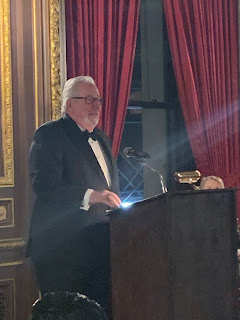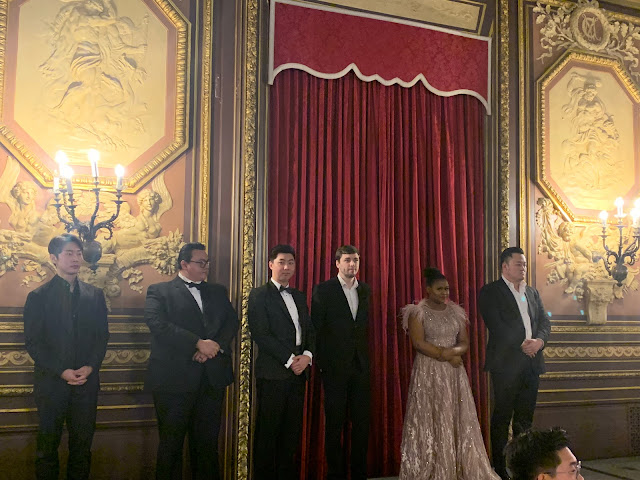Le Bu, Minki Hong, Joseph Sacchi, Gabrielle Beteag, Esther Tonea, Brittany Olivia Logan,
Fanyong Du, and Jonathan Kelly
For the past 22 years, the memory of legendary tenor Giulio Gari has been kept alive by his widow Gloria by means of a foundation established in his memory by the late Stephen DeMaio ad the great soprano Licia Albanese. The goal of the foundation is to discover, support, and encourage young opera singers.
After welcoming remarks from Mrs. Gari herself and Donald S. Levine (a member of the Board of Directors and co-producer of the concert), the thrilling two-hour concert was interrupted only by stirring comments by Artist Manager and Board Member Ken Benson.
Mr. Benson is well known and much appreciated for his devotion to young singers and that makes him a most valuable member of Planet Opera. We always like to hear what he has to say because we agree with his perspective!
We also enjoyed hearing from soprano and gifted teacher Catherine Malfitano who shared interesting tidbits about her career. We recalled with pleasure the many times we sat in on her classes at Manhattan School of Music, witnessing her drawing incredible performances from her undergraduate students, many of whom have gone on to fame. It is hard to believe that this is the fiftieth anniversary of her debut at The New York City Opera, which launched a world wide career!
What we would most like to dwell on, however, is the array of talent set before us. The original program was amended due to the usual occupational hazards of opera singers--illness and prior singing commitments. However, we were not at all disappointed since we got to enjoy the superlative artistry of several of this year's award winners, as well as that of prior years' award winners.
As is our wont, we are not going to tell you, Dear Reader, which singers won awards this year or prior years, or how they ranked, or how much money they received. This is surely available on the Foundation's website. Our concern is what we experienced with our own ears and eyes. We were happy to see a couple of familiar faces onstage as well as some new ones. Each and every one had something grand to offer.
It also became clear to us the importance of repertorial choice. Frequently we heard a performance that was technically perfect but, due to vocal color or some other factor, did not quite add up to the total immersion we feel when a singer's performance is so on point that the costume and scenery appear in our mind's eye and we are set down in the middle of an opera. That's magic!
For example, soprano Brittany Olivia Logan made a most believable diva in "Io son l'umile ancella" in which the anything-but-humble star of Cilea's Adriana Lecouvreur lets out all the stops. However, in spite of her flawless singing, she was less believable as the truly humble seamstress Mimi in Puccini's La Bohême. We could see her as an excellent Musetta! However, tenor Fanyong Du was totally believable as the ardent writer Rodolfo as they performed the duet "O soave fanciulla".
Similarly, soprano Esther Tonea created a strong Norma in the eponymous Bellini opera, easily conquering the master's lengthy legato lines and harmonizing beautifully with the Aldagisa of mezzo-soprano Gabrielle Beteag in the "Mira, O Norma". Her performance of Grigoriu's "Muzica" (previously unknown to us) won our heart as Jonathan Kelly's dissonant intervals of seconds took us on a Roumanian journey. However, the much loved "Letter Scene" from Tchaikovsky's Evgeny Onegin, while technically brilliant, somehow did not convince us that this was a young woman experiencing the anxiety of first love. We found our attention focusing on Jonathan Kelly's piano performance in which he beautifully limned the composer's feelings about Tatiana's youthful passion.
Although Ms. Beteag satisfied in the role of Aldagisa she best revealed the size of her voice in "Re dell'abiso affretatti", Ulrica's aria from Verdi's Ballo in Maschera. The corduroy texture of her instrument lent menace, especially in the pianissimi and we really loved her lower register. There was something about those rolled "r"s that made our blood run cold. Ms. Beteag's performance of "Einsam wachend in der Nacht" showed a lot of potential for Wagnerian roles but it is the Ulrika that we will remember her for.
And while we are discussing Wagner, just see how Joseph Sacchi negotiated "Siegmund heiss ich und Siegmund bin ich" from Act I of Wagner's Die Walküre! We have a burgeoning heldentenor here, hampered only by his miming the removal of the sword Nothung from the tree in Hunding's hut, demonstrating to Sieglinde that he was indeed her long lost twin brother. We have no idea how one could do a better job physically but maybe just abandoning the effort?
It was a fine performance vocally, and far more interesting than the monologue from Britten's Peter Grimes.
Baritone Minki Hong succeeded in creating the character of Gérard in the ironic and heart-breaking aria "Nemico della patria" from Giordano's Andrea Chénier. We admired the lovely Italianate legato phrasing. We also enjoyed a Korean song by Kim which offered Mr. Hong the opportunity to show a sweeter coloration and dynamic variety. The song was called "A Thousand Winds" and had to do with a deceased person's spirit metamorphosed into nature.
We have already mentioned the success of Mr. Du as Rodolfo and we also enjoyed his aria from Gounod's Les Pêcheurs des Perles--"Je cross entendre encore". He exhibited a full tone, a fine vibrato, and exquisite dynamic control. We do love a gradually spun out decrescendo!
There was more Gounod to close the program with Ms.Logan, Mr. Du, and the sensational bass-baritone Le Bu creating the trio finale from Faust--"Ange pure, Ange radieux".
The thrill of witnessing young artists from their conservatory days to their fame on world stages is something that we cherish. Bravissimi tutti!
© meche kroop




